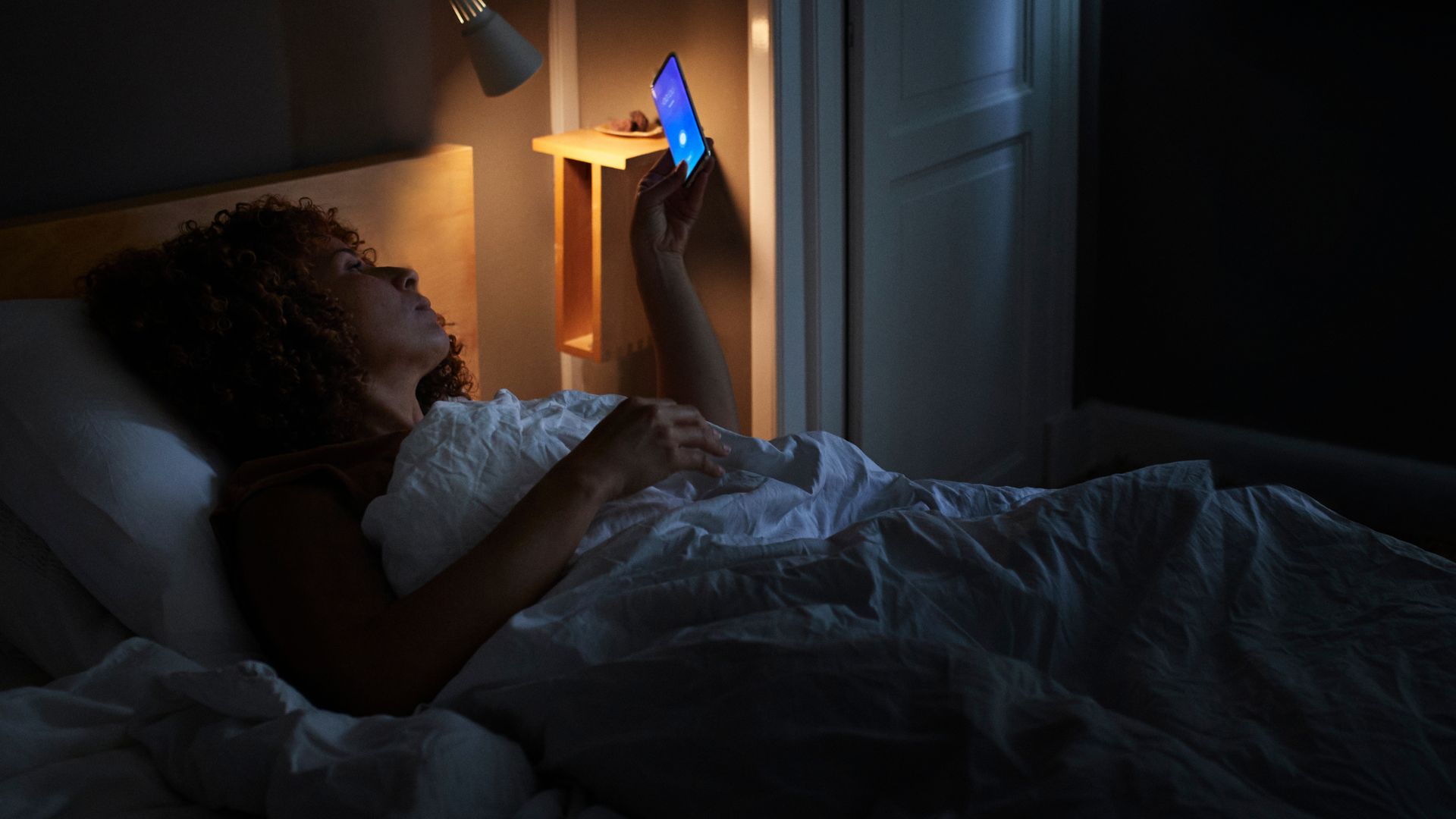This is what actually happens when you look at your phone before bed
We all want to know does blue light affect sleep as much as we think it does. The experts have something a little unexpected to say on this...


We've all done it - skincare routine done, pyjamas on, in bed to settle down for sleep, only to take out our phone and scroll away on social media. Sometimes it's the only free time in the day to do so, but it's making a difference to the quality and quantity of our sleep in ways we might not expect.
The impact of blue light on sleep is the main reason experts give as to why we shouldn't look at our phones in the hours before bed. This light is produced from electronic devices such as mobile phones, laptops, and televisions, and it can disrupt our natural body clock. But is ignoring the impact of blue light really what's stopping us from drifting off?
Here, the experts offer the lowdown on blue light and what you need to know about looking at your phone before bed. Plus, they reveal how to sleep better with a wind-down routine designed for the modern age.
Does blue light affect sleep?
Yes, blue light makes us feel more awake. It boosts brain function, helps memories develop, and elevates our mood - three things you'll want to wake up early in the morning but avoid when trying to get to sleep at night. It does this because tricks the brain into thinking it's daytime by disrupting the sleep-wake cycle.
"Our sleep-wake cycle (or circadian rhythm) is intrinsically linked to light," says Theresa Schnorbach, a psychologist and sleep scientist who specialises in clinical psychology and cognitive neuropsychology. "There is a central circuit in our brain that is sensitive to light and [this circuit] controls the production of the hormones that support when we sleep and when we wake."
A study conducted at Harvard University revealed blue light suppresses melatonin production for twice as long as green light, which is emitted from sources like the sun and light bulbs, so it truly does have an effect.
However, as much as blue light impacts our sleep-wake cycle, several studies suggest it doesn't do so for long. "The effects of blue light can depend on duration and intensity of exposure, as well as individual sensitivity," says Schnorbach, who works with Emma. "Some studies have tested the influence of blue light on sleep and found minimal impact, with some suggestions being that it only adds around 10 minutes to the time it takes to fall asleep."
Sign up to our free daily email for the latest royal and entertainment news, interesting opinion, expert advice on styling and beauty trends, and no-nonsense guides to the health and wellness questions you want answered.

Theresa Schnorbach is a psychologist and sleep scientist, specialised in Clinical Psychology and Cognitive Neuropsychology. She has completed a post-graduate training in Cognitive Behavioural Therapy for Insomnia (CBT-I) with the German Sleep Society (Deutsche Gesellschaft für Schlafforschung und Schlafmedizin (DGSM)), endorsed by the European Research Society.
Is it really that disruptive?
It's not just blue light preventing our sleep and ruining our sleep hygiene - it's the combination of blue light and what we look at on our phones. "Social media apps are often designed to be engaging, with exciting and addictive content highly stimulating for our mind. It's the stimulation that means we lose track of time and can prevent the state of calm we require to sleep," says Schnorbach.
"While the impacts of blue light on sleep may differ for different people, the content on your phone is likely to stimulate your brain in a way that's disruptive to rest," she says, so this doesn't solely apply to phones. You may notice you can fall asleep fine after doing some light admin on your phone before bed but struggle to drift off after reading for an hour.
When we see or read something - like an alarming post on social media or a particularly gripping book chapter - that triggers our interest, the body can go into a minor state of stress. In this state, a review by Henry Ford Hospital outlines, the body releases adrenaline and cortisol, which causes the heart rate to rise. It might be hardly noticeable, but it pushes the body into so-called 'fight or flight' mode which, as the name suggests, is hardly conducive to good sleep.
This, combined with the other reasons for insomnia, such as eating late at night or menopause symptoms like night sweats, is a recipe for a bad night's sleep.
How to relax before bed
It's better to avoid looking at your phone at least one hour before you try and go to sleep, if possible. "I would recommend prioritising sleep by minimising screen time in the hours before bed and instead, filling your evenings with activities that promote relaxation, such as taking a bath or listening to soothing music." You can also follow our guide on six simple tricks to help you fall asleep in three minutes.
If you need to look at your phone or like to read before bed, take a look at these tips to get your brain ready for rest.
- Follow the 20-20-20 rule: Look at something 20 feet away for 20 seconds every 20 minutes to prevent eye strain. Look out of the window if your bedroom doesn't stretch that far.
- Use 'night' mode: Most modern mobile phones come with a 'night shift' mode you can enable in the evenings. While it's not a 'cure-all', it reduces the amount of blue light from your phone.
- Be careful what you look at: Approach social media, messages, emails, and even books mindfully when you get into bed. Opt for platforms that avoid re-sharing the daily news or potentially disturbing content and read a book that isn't too mentally or emotionally challenging.
- Avoid eating foods high in protein, fibre or fats late at night: There's nothing wrong with a midnight snack but foods rich in these three macronutrients will take longer to digest than others, potentially causing some discomfort in the early hours.
Many people ask 'do blue light glasses work?' when it comes to improving their relationship between sleep and electronics. The idea is that you wear these glasses throughout the day or for a few hours before bed and they block all the blue light coming from your mobile phone, laptop, or television. However, it may be better to opt for one of the tried and tested best sleep aids as there's little evidence to suggest these are entirely effective.

Grace Walsh is woman&home's Health Channel Editor, working across the areas of fitness, nutrition, sleep, mental health, relationships, and sex. She is also a qualified fitness instructor. In 2025, she will be taking on her third marathon in Brighton, completing her first ultra marathon, and qualifying as a certified personal trainer and nutrition coach.
A digital journalist with over seven years experience as a writer and editor for UK publications, Grace has covered (almost) everything in the world of health and wellbeing with bylines in Cosmopolitan, Red, The i Paper, GoodtoKnow, and more.